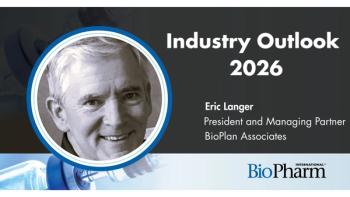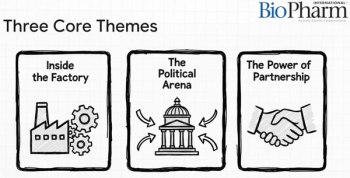
Sustainability Becomes Essential: Green Manufacturing and Supply Chain Resilience in Bio/Pharma
Dave Miller, PhD, explains how environmental audits, waste reduction, and supply chain security are reshaping priorities in pharmaceutical manufacturing.
*full transcript below
In part 4 of our 5-part interview series on the current CDMO landscape, Dave Miller, PhD, chief scientific officer at AustinPx, discusses the growing centrality of sustainability in pharmaceutical manufacturing, noting how it has shifted from a peripheral concern to a core industry requirement. He observes that over the past five years, eliminating harmful solvents, reducing carbon footprints, and strengthening supply chain resilience have moved from “nice-to-have” benefits to mandatory criteria for many large pharmaceutical companies. “The conversation on sustainability… has changed dramatically,” Miller says, pointing to evolving client expectations and more rigorous environmental audits.
He explains that sustainability now factors into multiple aspects of drug product development, from the choice of manufacturing processes to the selection of raw materials and excipients with lower environmental impact. Clients increasingly examine how CDMOs handle waste streams, ensure responsible disposal of pharmaceutical byproducts, and minimize reliance on energy-intensive inputs. Miller notes that these environmental measures are not just regulatory or ethical requirements but also a competitive differentiator, especially for domestic CDMOs whose practices are transparent and verifiable compared with some overseas operations.
The shift toward sustainability is also linked to supply chain security. By reducing dependency on certain inputs and adopting greener, more efficient manufacturing processes, companies can mitigate risk while meeting environmental goals. For Miller, this convergence of operational resilience and environmental responsibility marks a significant transformation in the way the industry defines quality and long-term value.
Check out previous parts of the interview series with Miller:
And be on the lookout for part 5 to drop on Monday, August 18!
About the interviewee
Dr. Miller brings over two decades of pharmaceutical development experience and has spent his career investigating ways to improve the bioavailability of poorly soluble molecules. As CSO of AustinPx, Dr. Miller leads the pharmaceutics and analytical development teams and oversees the application of the KinetiSol Technology. Prior to his current position, Dr. Miller served as Vice President of Research and Development at DisperSol Technologies and Senior Principal Scientist at Hoffmann-La Roche. Dr. Miller specializes in formulation and processing technologies for improving oral bioavailability of insoluble small molecules. He has applied his expertise toward advancing numerous drug candidates through all stages of development from early discovery to line extension. Dr. Miller is a co-inventor of the pharmaceutical applications of the KinetiSol technology and continues to be a key innovative driver for application and expansion of the platform. He has published over 40 research articles in peer-reviewed journals, authored 8 book chapters, and is co-editor of the First, Second, and Third Editions of the textbook, Formulating Poorly Water-Soluble Drugs. He is a co-inventor on numerous granted and pending patents worldwide. Dr. Miller holds a BS in Chemical Engineering and a PhD in Pharmaceutics from the University of Texas at Austin.
Transcript
*Editor’s Note: This transcript is a direct, unedited rendering of the original audio/video content. It may contain errors, informal language, or omissions as spoken in the original recording.
Yeah, that's a good question, and it's taken on some different nuances for us. What's near and dear is our KinetiSol technology. Its origins are in the plastics recycling space. So, as the history of the technology, I was a graduate student at the University of Texas, my co-inventor, Chris Brough, was an industrial engineer, developing a novel plastics recycling technology. He'd actually already developed it and was commercializing it at the point when I met him and recognized the value in that technology for creating novel pharmaceutical compositions, but also in doing so as a side effect, it was like, if we could utilize this platform, as opposed to traditional platforms like spray drying in pharmaceutics, we could eliminate a lot of solvent waste. So, the origins of the technology were already in recycling and trying to conduct manufacturing and improve in a more environmentally friendly way, to improve the environment.
It was sort of a green approach when we started back in 2007, but when we brought it over into the pharmaceutical industry, and one of the key advantages aside from the compositions we could create was we're eliminating solvents… this is gonna be great. All these chlorinated solvents that are being used to create these formulations, all these toxic solvents, the energy that goes into evaporating and recovering solvents, we're eliminating all of that.
And we thought that back in 2007, up until for several years thereafter, we thought that was a disadvantage. But when we would talk to large pharma partners, it's a nice to have, right? It's ultimately, we need the product, but if in turn you can also eliminate solvents and it's more environmentally friendly, that's a small cherry on top.
But that conversation has changed dramatically in the last five years, where eliminating solvents and being more environmentally friendly and reducing carbon footprint and shoring up the supply chain by eliminating some, some key inputs to the manufacturing process that you no longer need to consider, that's become extremely important now.
So, the conversation’s changed. From when we started to where we are now, that sustainability requirement has not just a check checkbox; now, it's mandatory. A lot of our large pharma clients that have historically used organic solvents in their drug product manufacturing, particularly to enable molecules, are now actively pursuing greener options.
And we just find ourselves in the right place at the right time. So, starting with our KinetiSol technology, we are seeing sustainability as being key. And, also, our clients audit us to ensure that we're good global citizens and that we handle our waste streams appropriately. We have all the environmental measures in place to ensure that, you know, we're not dumping pharmaceutical waste into bodies of water nearby, and I think that's another differentiator in the CDMO space for domestic versus, say, Eastern markets. You're never really exactly sure, what their sustainability practices are, but for us, it's part of the audit process now is seeing how we handle our waste streams. So, yeah, the conversation on sustainability with respect to environmental friendliness has changed dramatically.
And I think we were always there at the start. Our focus was to move a green technology to the forefront. And then sustainability has also sort of shifted into, as I touched on before, shoring up the supply chain, making sure that the inputs to your manufacturing process are also green, sustainable, and again, with processes like our KinetiSol, you can eliminate things like organic solvents, the need for purified nitrogen, , utilizing excipients that don't require the same sort of energy consumption and the carbon footprint to create. I think it's really important. Like I said, we've seen a sea change in sentiment with respect to green technology from when we started to today, and it's becoming an area where we are ahead of the competition in terms of winning new business. When they look at our approach to green manufacturing and recognize we've been here all along, ringing that bell, and it's more than just a cherry on top now. It's essential. It's a foundation.
Newsletter
Stay at the forefront of biopharmaceutical innovation—subscribe to BioPharm International for expert insights on drug development, manufacturing, compliance, and more.




